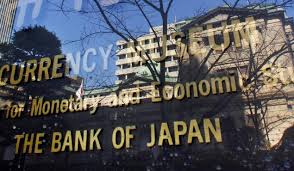By Andy Sharp - Dec 5, 2012 9:39 AM GMT+0400
 The BOJ should ease until inflation of 2 percent or 3 percent is reached, Koichi Hamada, 76, a retired Yale University economics professor who taught Shirakawa at Tokyo University, said in a phone interview yesterday. That would be “no problem” if opposition leader Shinzo Abe, whom Hamada advises on policy, wins national elections this month as polls suggest and appoints a more aggressive central-bank chief, he said.
The BOJ should ease until inflation of 2 percent or 3 percent is reached, Koichi Hamada, 76, a retired Yale University economics professor who taught Shirakawa at Tokyo University, said in a phone interview yesterday. That would be “no problem” if opposition leader Shinzo Abe, whom Hamada advises on policy, wins national elections this month as polls suggest and appoints a more aggressive central-bank chief, he said.
Bank of Japan (8301) Governor Masaaki Shirakawa’s former professor said the next head of the central bank could end decades of deflation in months by going beyond the current governor’s “very weak” efforts.
Politicians including Abe are increasing pressure on the BOJ for more monetary stimulus before a leadership change at the bank that offers any new government the chance to install a pro- easing majority on the central bank board. Shirakawa, criticized for his perceived failure to reverse years of deflation and boost an economy at risk of recession, ends a five-year term on April 8.
“Shirakawa forgot the right kind of economics,” Hamada said from his home in Wallingford,Connecticut, adding that his former student merits a ‘C’ grade on an A-C scale for his performance at the BOJ. “He sticks to his principles and doesn’t use flexible political judgment.”
The yen fell to a seven-month low last month after Abe, 58, called for unlimited monetary stimulus and an inflation target of 2-3 percent, easing pressure on exporters including Toyota Motor Corp. and pushing monetary policy to the foreground in Abe’s campaign for the Dec. 16 election.
Recession Risk
An economy at risk of a second straight quarter of contraction may spur an Abe-led government to seek a pro-easing majority at the BOJ, as the terms of Shirakawa’s deputies, Hirohide Yamaguchi and Kiyohiko Nishimura, end in March and two former private-sector economists on the nine-member board show signs of favoring more stimulus.
Hamada taught Shirakawa in 1972. He said the central bank governor was an “intellectual-looking” student who would frankly criticize his opinions. As head of the BOJ, his policy of buying short-term government bonds is “very weak,” Hamada said.
Hamada, who in 2001 suggested that the BOJ should adopt an inflation target of 1 percent to help change price expectations, said the central bank could buy foreign bonds and debt with longer maturities, as well as increase purchases of real estate investment trusts and exchange-traded funds. Any inflationary concerns could be eased by raising the benchmark interest ratefrom the current 0.1 percent, he said.
Inflation Goals
A BOJ spokesman said that the central bank governor doesn’t comment on remarks by individuals. Shirakawa, 63, said at a press conference last month that a 3 percent inflation goal is unrealistic and that unlimited money printing could worsen the national debt.
BOJ Deputy Governor Kiyohiko Nishimura declined to comment at a press conference today when asked about Hamada’s remarks.
Prime Minister Yoshihiko Noda this week called a 2 percent to 3 percent inflation target unrealistic and said that that the bank shouldn’t be forced to buy bonds in the open market.
The BOJ set a 1 percent inflation goal in February and has said it will pursue aggressive easing until that target is in sight.
At its meeting on Oct. 30, the BOJ added 11 trillion yen ($134 billion) to its asset-purchase program, expanding its main policy tool for the second time in two months, and unveiled an unlimited program to support bank loans. Two new members of the board, Takehiro Sato andTakahide Kiuchi, voted at the meeting for a more expansionary wording of the bank’s price outlook, minutes of the session show.
Next Governor
Abe, who was elected head of the Liberal Democratic Party in September after resigning the premiership in 2007 after one year in office, is not guaranteed his first choice of BOJ governor. Any nomination for the position can be blocked in the upper house, where the LDP and its partner New Komeito hold fewer than half the seats.
In 2008, the opposition-controlled upper house rejected two candidates for governor put forward by an LDP government before accepting Shirakawa’s nomination.
“What Abe says now as the head of an opposition party is irrelevant,” Yoichi Takahashi, another economic adviser to Abe, said in a separate interview last week. “I don’t think he will say these things if he becomes prime minister.”
Contenders to succeed Shirakawa under an Abe administration include Kikuo Iwata, an economics professor at Gakushuin University and Kazumasa Iwata, president of the JapanCenter for Economic Research, Hamada said. He also named Heizo Takenaka, a former economic policy minister and Haruhiko Kuroda, president of the Asian Development Bank, as potential candidates.
To contact the reporter on this story: Andy Sharp in Tokyo at asharp5@bloomberg.net
To contact the editor responsible for this story: Scott Lanman at slanman@bloomberg.net